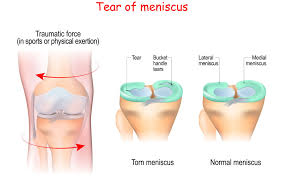Meniscal tears are among the most common knee injuries, particularly affecting individuals engaged in sports or physical activities. While anyone can experience a meniscal tear, the risk is higher for athletes, older adults, and those with joint degeneration. Understanding the causes, symptoms, and management options is essential for preventing further damage and ensuring a speedy recovery. Let’s explore who is most likely to experience meniscal tears and how to effectively manage them, with insights from the best orthopedic surgeon, Dr. Potla Sivaiah.
Who Gets Meniscal Tears?
1. Athletes and Active Individuals
Athletes, especially those involved in high-impact sports like football, basketball, or tennis, are more susceptible to meniscal tears. These tears often occur due to sudden twisting, pivoting, or impact on the knee joint. Even weightlifters or runners can experience meniscal tears because of the repetitive strain placed on the knee.
2. Older Adults
As we age, the meniscus (the cartilage in the knee joint) becomes weaker and less flexible. This degeneration increases the risk of tears even with simple movements like squatting or stepping wrong. Older adults are more prone to degenerative meniscal tears, which may occur over time due to wear and tear rather than a sudden injury.
3. Individuals with Joint Degeneration
Those who have underlying joint conditions, such as osteoarthritis, are also at higher risk for meniscal tears. The weakened cartilage in the knee joint may lead to tears with minimal stress or injury. For these individuals, meniscal tears can often be chronic and harder to manage without medical intervention.
Symptoms of Meniscal Tears
- Pain: The most common symptom, which is typically localized around the knee.
- Swelling: Inflammation in the knee joint may occur within a few hours or days of the injury.
- Stiffness: Difficulty moving the knee or extending the leg fully is a common complaint.
- Locking or Catching Sensation: Some people feel as though the knee is locking or catching during movement, making it difficult to walk.
- Instability: A feeling of weakness or instability in the knee joint.
Management of Meniscal Tears
Meniscal tears can vary in severity, and treatment will depend on the nature of the injury, the patient’s age, and overall health. Dr. Potla Sivaiah, one of the best orthopedic surgeons, offers expert guidance on managing meniscal tears effectively.
1. Non-Surgical Management
For minor meniscal tears, conservative treatments are often recommended. These include:
- Rest: Avoiding activities that place strain on the knee.
- Ice and Compression: Reducing swelling and pain.
- Physical Therapy: Strengthening the muscles around the knee to promote stability and recovery.
- Medication: Nonsteroidal anti-inflammatory drugs (NSAIDs) can help manage pain and reduce inflammation.
2. Surgical Intervention
For more severe meniscal tears, especially those that do not heal with conservative management, surgery may be necessary. Dr. Potla Sivaiah is a specialist in advanced arthroscopic surgery, a minimally invasive procedure that allows for quicker recovery times and reduced risk of complications.
- Meniscectomy: The removal of part of the damaged meniscus.
- Meniscal Repair: In some cases, the torn portion of the meniscus can be repaired, which is ideal for younger patients or those with a tear in a well-vascularized area of the meniscus.
- Meniscal Transplant: In rare cases where the meniscus is severely damaged, a transplant may be recommended.
3. Post-Surgery Rehabilitation
Rehabilitation plays a crucial role in recovery from meniscal tear surgery. Dr. Potla Sivaiah emphasizes a structured rehabilitation program to restore knee function, strengthen muscles, and prevent future injuries.
- Physical Therapy: Exercises focused on improving range of motion, strength, and stability.
- Gradual Return to Activity: Patients are advised to avoid high-impact activities until full recovery is achieved.
Preventing Meniscal Tears
While some factors, such as age-related degeneration, cannot be controlled, there are several ways to reduce the risk of meniscal tears:
- Strengthen Knee Muscles: Regular exercises that focus on the quadriceps, hamstrings, and calf muscles can help support the knee.
- Proper Warm-Up: Always warm up before physical activity to ensure the knee joint is flexible and ready for movement.
- Avoid Sudden Twists: Be cautious during activities that involve pivoting or rapid changes in direction.
- Maintain Healthy Weight: Keeping a healthy body weight reduces stress on the knee joints.
Consult with Dr. Potla Sivaiah for Expert Care
If you suspect a meniscal tear or are dealing with chronic knee pain, it is essential to consult with an experienced orthopedic specialist. Dr. Potla Sivaiah, recognized as one of the best orthopedic surgeons, offers state-of-the-art treatment options for meniscal tears, ensuring optimal recovery and long-term joint health. With his expertise in both conservative management and surgical intervention, patients receive comprehensive, personalized care tailored to their specific needs.
Meniscal tears are a common yet manageable injury that can affect anyone, from athletes to older adults. With timely intervention and proper care, most individuals can recover fully and return to their normal activities. Trust Dr. Potla Sivaiah, one of the best orthopedic surgeons, to guide you through every step of the treatment process, ensuring the best possible outcomes for your knee health.

